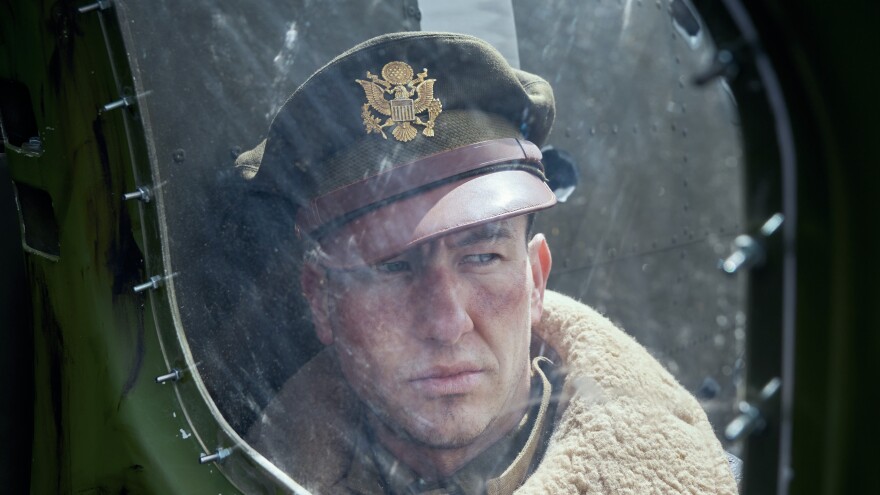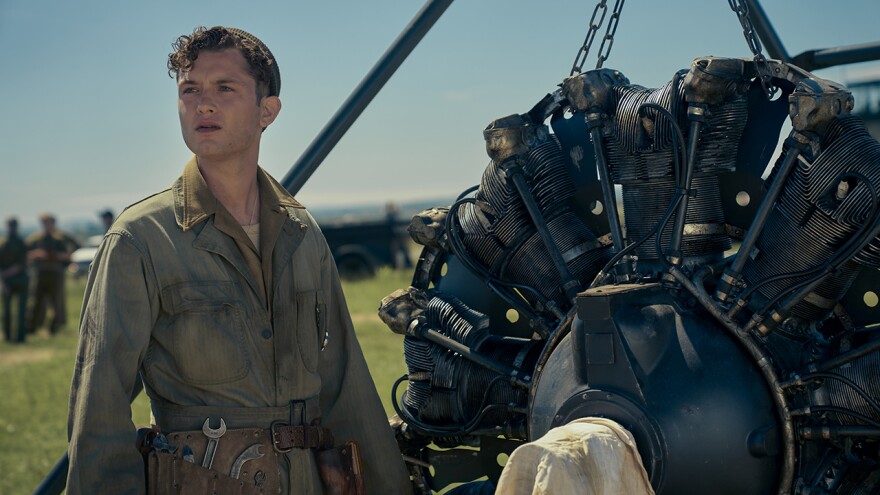BETHLEHEM, Pa. — The World War II drama series "Masters of the Air," produced by Steven Spielberg, Tom Hanks and Gary Goetzman, will premiere next January on Apple TV+.
The series is based on a book by Lafayette College professor Donald L. Miller, and scripted for television by John Orloff.
The nine-episode limited run will tell the true story of the 100th Bomb Group (the “Bloody Hundredth”) as it conducted high-altitude bombings under perilous conditions.
LehighValleyNews.com recently spoke with Miller about writing the book, the production of the show and more. Questions are in bold and Miller's answers follow. The transcript has been edited for length and clarity.
Q: We finally learned that “Masters of the Air” has a premiere date. How are you feeling?
DM: "I’m relieved, I can tell you that. We’ve had some roadblocks along the way. Some of them were unforeseen, you know, such as COVID and all kinds of things, but we’re finally there.
"We were flying high originally.
"It took a while to conceptualize because it was a huge production. We were talking about it the other day — the entire team involved. It really was a project we should have expected to go 10 years. That’s pretty much what it took to do 'Band of Brothers' and 'The Pacific.' This was even more ambitious in terms of the technology involved in doing an air war."

Q: Did you know as production ramped up what it was going to look like in the end? It’s produced like a film but it’s going to be a nine-episode series.
DM: "What pleased me is every iteration of this — every time we went back and relooked at it and made changes — it was for the best. I think we consistently improved the product as we moved along. What was very encouraging is that quite a few people who worked on it are convinced this is an even better film than before some changes were made.
"[Executive Producer] Tom Hanks kept telling us, 'You’re not going to realize if it's good or bad until you see it.'"
READ:
Lafayette professor’s 'Masters of the Air' gets big-budget treatment and, finally, a premiere date
Q: What were some of the major challenges?
DM: "Well, we had five directors working on it, and in addition to that we had different editors and different writers. But when we finally saw the thing as a whole it really cohered very nicely. I think largely that was the result of [Executive Producer] Gary Goetzman. Gary was the dominating force in terms of putting the final product together. We had continuity too, just in terms of commitment from the actors from start to finish."
Q: In terms of the actual production — Tom Cruise said if a sequel to “Top Gun” ever was made at all, it would need to be done by getting the actors up in the air, and they did it for “Top Gun: Maverick.” But that was mostly all modern-day and “Masters of the Air” is set during World War II. So what were those challenges like?
DM: "We knew from the beginning we knew we weren’t going to film using old B-17s. That’s been tried, you know, in the film ‘12 O’Clock High.’
"We really thought the combat element had to be paramount because you have to see what they went through and to get a feel for the danger involved, the peril involved, the difficulty involved.
"Just the cold, for example. The Air Force really didn’t figure this out early on that frostbite would be a bigger problem than the Germans. Nor did they think that combat fatigue, or what we now call PTSD, would be that much of an issue or manifest itself. They largely reacted to traumas — the loss of another plane, a horrible air accident in the mission beforehand and then they would just revisit it. It was this kind of shock effect and the wearing down of these airmen.
"It's fatigue, it’s going day after day of constant uninterrupted warfare that broke these guys down over the long haul.
"But the major action in this takes place inside the plane. How 10 men in a crew, sometimes 11, stood up or sometimes didn’t stand up under the stress and strains of combat."

Q: So you didn’t use old B-17s. What did you use?
DM: "[Executive Producer] Steven Spielberg had purpose-built three B-17s for the project. The propellers moved. Everything worked. Everything was an exact replica down to the last lightbulb. Everything was perfect, but the plane couldn’t fly. We had to use cranes and things for landings.
"If you know anything about those planes, you know the B-17 is a very narrow tube. It’s an aluminum tube. It’s a lot like a submarine. It’s very constrictive. The cameramen were having a lot of difficulty capturing the action, so our crews did modifications so they were wider than a real B-17. But you’re able to get the full effect because of the widening of the plane.
"Cinematically, at that point what you worried about was: 'Is this going to be one damn air fight after another?' That could tire after a while. But each of these missions we bring forward is a chapter and it’s unique. It’s absolutely unique. We don’t try to make anything up.
"‘Fidelity’ was our guide word. Everybody in the plane had a real name and was a real human being. There are no made-up characters or composite characters. These are guys who lived and breathed and walked the Earth."
Q: What do you want people to know about this series as they’re watching it?
DM: "We tried to capture the full air experience, not just the guys in the air. One of our major characters is a mechanic. The mechanics were utterly essential. The B-17s are a plane that can take terrible punishment but they’re repairable. And there’s a nice bonding that goes on across command lines. We try to bring women into the story and we do — Air Force intelligence officers and such, and the wives and girlfriends of the airmen.
"The one thing Tom Hanks kept talking about is making a cliche-free movie. So many movies are filled with cliches and scenes you’ve seen a dozen times. Tom was always there to make sure we got something original. We couldn’t just make things up."
Q: So there was careful work to be sensitive to this in the storytelling…
DM: "I’m very sensitive to this. As a nonfiction writer, our job is a lot easier since we have the record to work from, but that can be imprisoning. You can only use what’s available. It causes you to be very creative in your choices in what kind of incidents and personages you’re using and characters you're using.
"I think the series has great movement, great characterization and you see them in all their dimensions.
"But we didn’t just want to make a 'Hooray for USA' film. Bombing is a very controversial subject. How much should have been done — what targets should have been hit, were there going to be civilian casualties? The film has a moral dimension as well that maybe a documentary might miss, and we go straight at those kinds of dilemmas as the crew experienced them.
"The role of the Eighth 8th Air Force was really to destroy the German economy with as little collateral damage as possible with pinpoint bombing. But it was an oxymoron because of perpetual cloud cover over Germany and the nature of the German resistance and those things.
"Without being didactic and hitting readers with lots of explanations, through drama and the action itself we try to show the exceptional difficulties of carrying out these missions."
Q: What got you interested in telling this story, specifically?
DM: "I grew up in a military family and WWII-style in a working class community in Reading [Pennsylvania], where every man I knew — father, uncle, grandfather — was a participant in the war. My dad was in the Air Force. My uncle landed at Normandy. I had another uncle that flew bombers — B29s — over Japan. The war was eternally present in our lives.
"Anyway, after the war, the attics were filled with paraphernalia — bomber jackets, uniforms, German equipment. As kids we were up there getting into that stuff all the time.
"But the first five books I wrote were not on military history at all. I was interested in the history of cities and culture and what was called ‘the history of ideas.’ I watched war documentaries and that was about it until my father died in 1995. Then there was a lot of regret I hadn’t written about his war and this unbelievably epic story that was taking place all around me. So I thought maybe it was time to take this on."
Q: How did you learn about some of these airmen?
DM: "When you take on a project like that, writing a book like 'Masters of the Air,' you have to have a hook and an emotional commitment to it. You’ve gotta get back to that desk every day. You’ve gotta have that sizzle.
"For me, it was the stories that I encountered through interviews with the airmen and people like Robert ‘Rosie’ Rosenthal. I met him early on in my research and I was tremendously impressed with his modesty and when I learned more about him ... he claimed he wasn’t fighting because of what Hitler did to the Jews, but because of what Hitler did to humanity.
"Later on, when the war was over and he’d flown his 52 missions and was shot down three times, he went back to the law firm he worked at and he was bored as hell. He said, ‘This is a job I’d wanted all my life and yet compared to war it was so tepid. There was no emotional pull and the decisions we were making were kind of ridiculous compared to the decisions we had to make in the air.’
"Then he goes over and prosecutes some of these Nazi thugs in the Nuremberg trials. His closure came when these cases came to a conclusion."
Q: And his story was just one of many...
DM: "That’s how it happens. You meet one guy and you’re meeting a whole community of guys. One story after another was electrifyingly interesting. I couldn’t believe there were so many types of stories in the air war.
"My thought on bombing was that they were fighting an impersonal war at unimaginable heights and killing people from 30,000 feet, but it wasn’t that way. They came much closer to the enemy than most infantrymen. Up in the air, there’s no foxholes to fight in. It was just much different than people would have imagined."
Q: And you bring all of that into the series?
DM: "We spent a lot of the film in prison camps. A lot of the film is about the difficulties of prison life, where the uncertainty becomes a major factor.
"Listen, if I robbed a local Wawa, I get three to five years in a county prison. Those guys had no idea what was going to happen.
"There are so many types of experiences I hadn’t thought about we were able to include in the film, such as dropping food to the starving Dutch at the end of the war when the Germans in Holland were the last to surrender.
"We asked for permission to fly over and these B-17s did food drops. They had first refused ... and eventually they flew the mission and it was called ‘Operation Chowhound’ and it fed a whole nation for a while. So there were all these different manifestations of the air war I hadn’t thought about, so this takes in not just the air war but the whole war."


